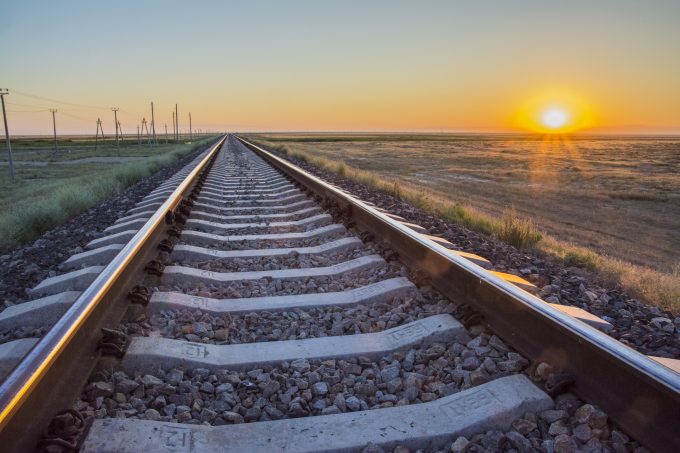Paolo Guidi to be new general manager of CMA CGM Italy
Paolo Guidi (above) has been appointed general manager of CMA CGM Italy, effective 1 May, ...

While demand for and supply of China-Europe rail services is growing fast, there remain several challenges to transporting some commodities safely.
JF Hillebrand, the drinks specialist forwarder, today announced the results of its attempts to ship wine along the route.
Together with Groupe InterRail, it conducted a test shipment of French wine from Duisburg to Yiwu. The container was exposed to temperatures of between -2°C and +58°C, with big fluctuations in humidity.
However, JF Hillebrand had lined the container with VinLiner, its protective foil system, which limited the wine’s exposure to temperatures of 9°-32°C : better, but still significant.
Meanwhile, its data loggers noted a lot of container movement, particularly in Kazakhstan and China, possibly the result of uneven rail tracks. The company said: “It reached a maximum of 2G, the equivalent of a rollercoaster, which means potential damage to the bottles inside the container if left without suitable protection. During this test no damage to the bottles or packaging was observed.”
The wine forwarder concluded: “There is still much to be done and to look forward to. Rail tracks can be improved to ensure smoother shipments…[there will be] an increased reefer availability on more routes.
“Consolidations should soon be an option allowing smaller shipments by rail. Chemical trend research should reveal the difference (if there is any) between the wine at departure and the wine at arrival, but also the difference between wine shipped by rail and wine shipped by sea freight.”
JF Hillebrand and InterRail have scheduled another test this month, to move spirits. It said: “One thing is clear though, shipping with dry containers is not an option; beer and wine will need to be shipped with reefer containers or insulated with VinLiner.”
While some perishables are now going overland, the majority of goods so far have been electrical and building supplies. Hewlett-Packard was one of the first companies to take to the route and was still accounting for some 30-40% of volumes earlier this year.
Carmakers have also tested services and, last month, Volvo became the first to export China-made cars to Europe by train. The first S90 premium saloon cars, built at Volvo’s new Daqing plant in China, arrived at a distribution centre in Zeebrugge, in June.
The growing attraction of the route has sparked concerns from Europol that the route will be used by counterfeiters, looking for faster supply chains. A report released last week said it was “logical” that illicit shipments would find their way on to the service.
“As rail freight services between the EU and China become more numerous and efficient, and China develops its Belt and Road transport infrastructure, which are planned for the coming years, it is thought likely that increasing numbers of IPR (intellectual property rights)-infringing consignments may arrive at the eastern EU external borders by train; from where, if they are not intercepted, they could then travel throughout Europe.”
Volumes on the route are growing apace and services are expected to nearly triple by 2020, when some 5,000 trains a year, or 96 a week, will easily surpass last year’s 35 a week.
While the rail service is expected to take volumes from both sea and air, there have also been some concerns over security on the route. As a result, insurer the TT Club is looking to offer protection from liability exposures. It has drawn up “robust trading conditions” for multimodal transits, it said last week.
“These conditions aim to offer a contractual framework to meet the requirements of the ever-growing trade flowing from the ‘One Belt, One Road’ initiative,” it said in a statement.
“The rail consignment note is a bilingual document in English and Mandarin, addressing these requirements of moving freight across two continents and through multiple jurisdictions, where a number of legal regimes may be in force. The contractual terms … of the rail consignment note regulate the operator’s liability during the transit.”
It drew up the terms following a request from a member in Hong Kong, it added.
Forwarders, meanwhile, are increasingly investing in China-Europe rail. Kerry Logistics, which claims to be the first Asian 3PL to offer backhaul services, has been particularly active. Yesterday it announced it had bought 50% of Lanzhou Pacific Logistics (LPL), and will form a joint-venture with LPL’s other shareholder, China Railway Container Transport Company.
LPL has a nationwide rail freight network covering more than 100 cities. It provides container freight stations and domestic logistics services, for clients shipping chemicals, auto parts, agriculture and building materials industries.
Last week, Kerry announced that it had launched a weekly LCL service between Duisberg and Shanghai. CEVA Logistics has also announced a new service, linking Shilong in Guangdong to Hamburg, in a 17-19 day trip. CEVA operates both FCL and LCL services out of China.
Comment on this article